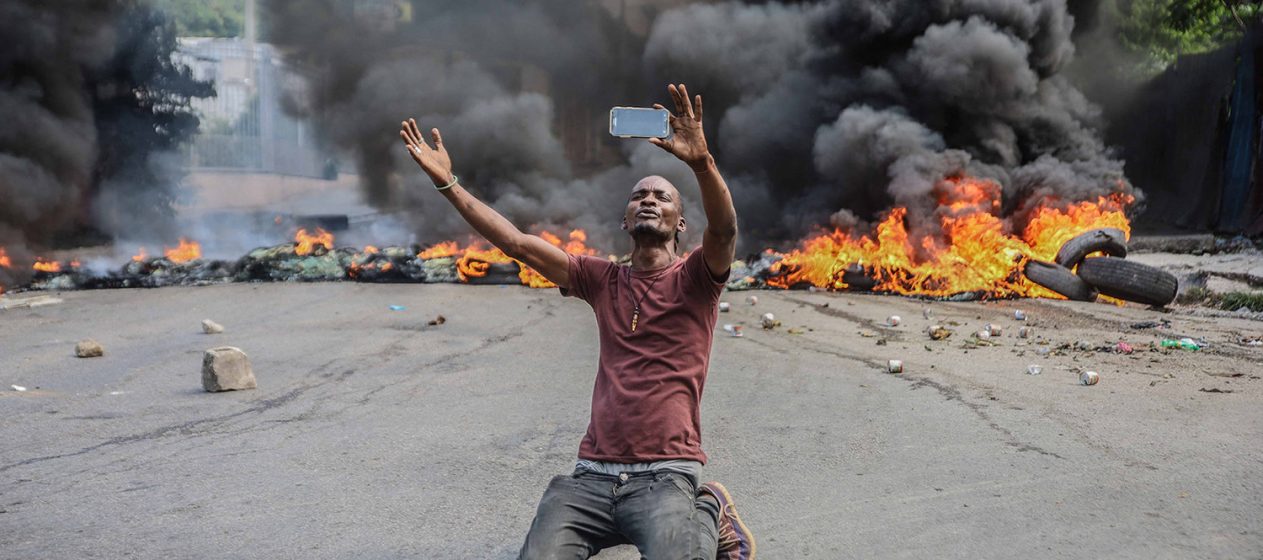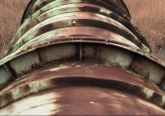The unfolding events in Haiti are reminiscent of the American superhero film, “The Dark Knight Rises”. The key distinction between the Caribbean country and the final chapter of Christopher Nolan’s Batman trilogy is that, so far, no superhero has emerged.
In the film, Bane, Batman’s main antagonist, orchestrates chaos and upheaval in the crime-ridden Gotham City by releasing criminals from prison. Portrayed as a symbol of anarchy, Bane exploits societal divisions by mobilizing the disenfranchised against Gotham’s corrupt social order. Meanwhile, Batman, depicted as the “Dark Knight”, emerges as a beacon of hope and justice, collaborating with Gotham City’s remaining police force to resist the Super-Villain Bane’s destructive agenda and restore stability to the city.
Haiti’s Gang Insurrection
Today, Haiti’s police force finds itself grappling with a real-life Bane, embodied by the notorious gang leader, Jimmy Chérizier, known by his alias “Barbecue”. Having freed thousands of prisoners and unified the country’s most powerful crime syndicates under the guise of being the Caribbean Robin Hood, Chérizier is leading a “criminal insurgency” targeting Haiti’s governmental buildings and key infrastructure.
On 29 February 2024, chaos engulfed Haiti as criminal groups orchestrated a coordinated onslaught, shutting down the nation’s vital logistical lifelines by seizing control of the international airport and main seaport. Concurrently, the gangs launched strategic attacks on more than a dozen police stations, forcefully releasing thousands of criminals from Haiti’s two biggest jails. Rival gangs, uniting with a common goal, descended upon Port-au-Prince, the country’s capital, to oust the acting Prime Minister Ariel Henry, who should have organized elections and stepped down by 7 February 2024, but instead chose to struggle to stay in power.
Amidst Haiti’s political turmoil, Jimmy Chérizier, the elite police officer-turned-mobster, has leveraged the security vacuum to elevate his personal status, emerging as one of the nation’s most powerful – and cartoonish – figures. Chérizier might be a brutal criminal, yet he also holds a cult-like status in Port-au-Prince. In interviews, he portrays himself as a God-fearing Caribbean Robin Hood, drawing inspiration from revolutionary figures like Fidel Castro and Che Guevara.
Chérizier, who claims to champion the cause of the impoverished against Haiti’s corrupt government forces, fervently asserts, “Either Haiti becomes a paradise or a hell for all of us. It’s out of the question for a small group of rich people living in big hotels to decide the fate of people living in working-class neighbourhoods.”
During a video call with ABC News on 11 March, Chérizier remarked that “the first step is to overthrow Ariel Henry and then we will start the real fight against the current system, the system of corrupt oligarchs and corrupt traditional politicians.” If Prime Minister Henry does not step down and if the international community continues to support him, the mobster has threatened that the country will be on a direct path toward civil war, culminating in genocide.
On 14 March, Ariel Henry agreed to resign amid mounting pressure and escalating violence across the country. Gang violence, however, has failed to decline. On the contrary, over the last few weeks, violent clashes between armed gangs and Haitian police forces have escalated to an unprecedented scale. Gangs have attacked the country’s wealthiest districts, leaving at least a dozen people dead on the streets. Facing an unparalleled catastrophe, a senior Haitian police officialdeclared that “the country is falling apart. There is no state authority left; the authorities now are the criminals.”
Haiti is now on the brink of collapse, because of the desire of an outlaw driven by his personal desire to reshape the Haitian nation according to his own twisted vision. The critical question looms: will a “Dark Knight” rise to counter Haiti’s Bane and prevent the nation from descending into irreversible collapse?
The Need for International Support
If, and how, Haiti’s gang violence crisis will be resolved remains unclear. What is evident, however, is that the likelihood of Haiti escaping its current predicament through harnessing internal dynamics seems slim. The county’s key state organs have been severely weakened and are on the verge of collapse. Political and security forces are outnumbered and outgunned by better-equipped criminal organizations. The transitional presidential council, formed after Haitian Prime Minister Ariel Henry’s resignation announcement, is far from being operational.
Many areas of the country are already under the control of criminal gangs, which has led to the displacement of more than 362,000 Haitians. In 2024 alone, criminal gangs have been responsible for the deaths of more than 1,100 individuals and the injuring of almost 700 others.
Without foreign security support, the likelihood that Haiti will succumb entirely to the grip of criminal syndicates will only increase. Preoccupied by the Ukraine War and Israel’s operations in Gaza, the international community has consistently failed to put Haiti’s crisis on the global security agenda.
Nevertheless, some international efforts are unfolding. The UN Security Council has recognised the central role of the Caribbean Community (CARICOM) in aiding Haiti’s endeavours to address the current political deadlock and security challenges. Washington is also looking for a viable path ahead. Following urgent talks in late March involving US, Haitian, and neighbouring officials, CARICOM revealed plans to establish a committee comprised of Haitian representatives, tasked with guiding the nation towards holding upcoming elections.
These developments represent a crucial – and long overdue – step in the right direction. Sustainable security can only be established in Haiti through long-term cooperation between domestic stakeholders and international partners. Sending a UN security force to collaborate with Haitian police and security forces suggests that the international community is finally committed to taking action. On the other hand, it is important to remember that sending an armed foreign mission to Haiti without effective coordination with local political and social forces would likely sustain the upheaval, rather than abate it.
Haitians Oppose Foreign Intervention
Haiti is the world’s oldest black-led republic and the first independent Caribbean state, a historical beacon of progress and emancipation in the (post-)colonial world. Throughout the nation’s history, Haitians have consistently opposed any foreign intervention in their internal affairs, regardless of the level of chaos or anarchy. Despite numerous instances of foreign military interventions, none have succeeded in bringing stability to Haiti.
It is therefore imperative that foreigners refrain from imposing a government on Haiti, and instead prioritize the involvement of local citizens in reconstruction efforts. Chérizier has already vowed to resist any foreign presence entering Haiti with force. International security assistance that does not work in tandem with Haitian political actors and security forces may thus inadvertently grant legitimacy to “Barbecue” and his allies.
During the Haitian Revolution (1791-1804), Toussaint L’Ouverture emerged as Haiti’s “Dark Knight” liberating the country from slavery and oppression. If history is a precedent, stability and legitimacy can only be restored to the country through the governance of a strong leader – a viable counterpart to Chézier’s Bane. The question is: who will rise to the occasion of becoming the Batman Haiti so desperately needs?
Note: This article reflects the views of the author and not the position of the DPIR or the University of Oxford.




